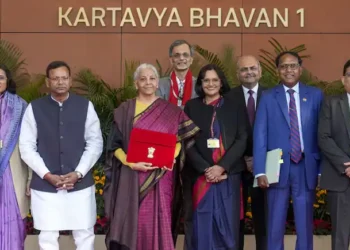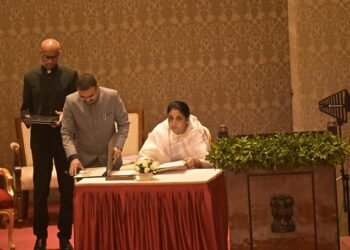A 16-year-old survivor recounted how his family was branded witches and set ablaze by villagers armed with sticks and petrol.
By Navin Upadhyay
July 8, 2025–In a chilling incident that has shaken the nation, five members of a tribal family were brutally beaten and burned alive in Tetgama village, under Mufassil police station in Bihar’s Purnia district, on July 7. The heinous crime—rooted in deep-seated superstition—was perpetrated by a mob of over 250 villagers who accused the victims of practicing witchcraft and black magic.
The victims, three women and two men from the Oraon community, were first thrashed with sticks and then doused in petrol and set ablaze. The shocking brutality of the act has sparked national outrage, drawn sharp political criticism, and prompted immediate police action. This report details the incident, reactions, and law enforcement response.
The Incident: Superstition, Violence, and the Annihilation of a Family
The horrific attack took place in the early hours of July 7 in Tetgama village, part of Rajiganj Panchayat. According to reports, a mob of around 250 villagers stormed the house of a family accused of witchcraft. They beat all five family members—three women and two men—with sticks and other blunt weapons, poured petrol on their bodies, and set them on fire.
The charred remains were later recovered by police. The only survivor, 16-year-old Sonu Kumar, managed to escape and alert the authorities. His testimony revealed that a local occult practitioner, Nakul Oraon, had incited the villagers by accusing the family of black magic—allegations that are still believed in some rural pockets of India.
READ: Chirag Paswan’s ‘243 Seats’ Gambit: Will He Walk the Talk?
Sonu Kumar’s statement has become the cornerstone of the police investigation. He described how the mob turned violent under the influence of superstition, and how the accusations spread like wildfire—ultimately ending in a collective act of savagery.
#Horrific Due to superstition 5 members of a family were burnt alive. The incident is from Tetgama village of Mufassil police station area of Purnia in Bihar where 250 people surrounded the women calling them witches, then beat them and then burnt them alive…. pic.twitter.com/O4uODfcH9J
— The Dalit Voice (@ambedkariteIND) July 7, 2025
Local reports said the attack left the village in a state of eerie silence. The brutal killings underline the persistent hold of blind belief and mob mentality in rural India, particularly in vulnerable tribal regions.
Outrage Over Governance and Superstition
The massacre has triggered sharp condemnation from political leaders, civil society, and citizens across the country. The attack has reignited debates around the prevalence of superstition-fueled violence, and the inability of awareness campaigns to address such deeply entrenched beliefs.
Rashtriya Janata Dal (RJD) leader and former Deputy Chief Minister Tejashwi Yadav was among the first to respond, slamming the Nitish Kumar-led state government. Taking to social media platform X, he said:
“In Purnia, five family members were burned alive. Bihar’s law and order has collapsed under the DK Tax regime – the DGP and Chief Secretary appear helpless.”
Yadav linked the Purnia killings with a recent massacre in Siwan, where three people were murdered, calling it evidence of “anarchy at its peak” in Bihar.
Opposition leaders have seized the moment to raise serious concerns about governance, law enforcement, and the government’s failure to contain spiraling mob violence. The tragedy has also revived attention on the Bihar Prevention of Witch (Daain) Practices Act, 1999, a law aimed at curbing witch-hunting and superstition-led crimes, which many argue is poorly enforced.
Social Media Reactions and Activist Voices
On social media platform X, users such as @ambedkariteIND and @Delhiite_ condemned the attack, calling it “horrific” and emphasizing the influence of blind belief in enabling mob killings. One user wrote:
“250 people surrounded the women calling them witches, then beat them and burnt them alive.”
Another highlighted the arrest of Nakul Oraon, pointing to the manipulative role played by local tantriks in such acts of violence.
Civil society organizations and human rights activists have also spoken out, stressing the urgent need to address the root causes—poverty, lack of education, and the social sway of self-styled occult practitioners. They’ve demanded that the state government act decisively against those inciting and participating in such violence.
Police Response: Immediate Action, Key Arrests, and Ongoing Probe
Following Sonu Kumar’s alert at around 5 a.m., teams from Mufassil police station and three nearby police stations reached the village. They recovered the charred remains and sent the bodies for post-mortem.
According to Sub-Divisional Police Officer (SDPO) Pankaj Kumar Sharma, an FIR was promptly registered based on Sonu’s statement. Three suspects, including Nakul Oraon, the tantrik who allegedly incited the mob, have been arrested and are currently being interrogated.
Purnia Superintendent of Police Sweety Sahrawat confirmed the arrests and said that efforts are underway to track down others who participated in or instigated the crime. Investigators believe the victims were first killed—likely beaten to death—and then their bodies burned in a bush to destroy evidence.
Police presence has been strengthened in the village to prevent any further unrest. Sonu Kumar, the sole witness and survivor, has been placed under protection.













